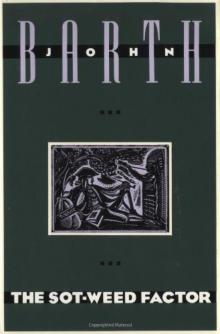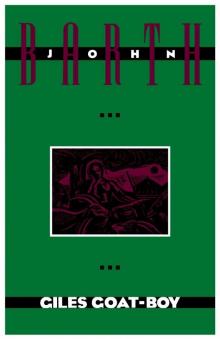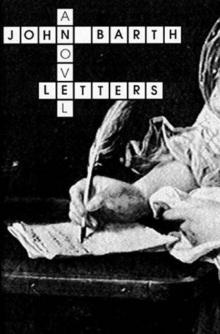- Home
- John Barth
Chimera Page 15
Chimera Read online
Page 15
The mad child offered to relinquish his claim to Corinth in my favor if she’d marry him. No deal. ‘Bellerus can have Corinth the way he has me,’ she would say sullenly: ‘by taking it, whenever he wants to.’ I decided what to give my brother for his birthday gift that night. Now it’s afternoon: Deliades has drawn Polyeidus out on the hero-business, above, brought him to preliminary images of Pegasus and Chimera, mentioned the Argonauts’ Funeral Stakes, here we go. Ignore the myths that locate Glaucus’s death at Iolchis or Theban Pontiae on the occasion of Jason’s funeral games for Pelias: it happened at the regular Isthmian games, which in those days we called the Argonauts’ Funeral Stakes in memory of the Pelian originals. It was a big day on the Isthmus, especially for Deliades: as many former Argonauts as could make it were there, and assorted other stars; strolling through the locker rooms was like touring a Hall of Fame; Dee-Dee, ecstatic, knew the program by heart, pointed out to me everyone from Acastus to Zetes, rattled off biographies and box scores like a sports announcer, urged me to help him catch the winged horse in time for us to race as a team next year, bet his whole allowance for the lunar month on Glaucus, a very long shot, to win the unlimited chariot event.
“ ‘Not a chance,’ I said. ‘Those mares are crazy.’ Deliades agreed, but loyally put his drachmae on the line; it would break Dad’s heart, he said, to lose the biggest race on the card, which he’d placed and showed in in the two years previous and trained for all that season. We pressed Polyeidus for prediction. ‘Don’t be impudent,’ he replied. In those days I drew sword readily. ‘Your father by a quarter-furlong,’ he crossly volunteered, ‘with hippomanes and your help. I see you’re meeting my daughter tonight in the grove again, which also happens to be on the far side of the finish line.’ By full-moon-light, he declared, near the lip of the well, grew the potent herb, which only a votary of the goddess could find and pluck: a mild aphrodisiac and hallucinogen to males of several species, it had a graver effect on mares, and for that reason, though its sale, possession, and use were prohibited by law, it was much favored by the mare-maids for their mysteries. Sibyl having shown some talent, even as a child, for sniffing it out, Polyeidus had apprenticed her to Aphrodite and become Eurymede’s exclusive dealer in the weed—the supply of which, however, was so small that for some years he had been able to meet the cult’s demands only by transforming himself into an amulet of concentrated ‘hip,’ as they called it, to be sniffed by the company in turn. In order to ingratiate himself with Glaucus, he confessed, what a story, he had offered to become that amulet that night: at post time Dad would give his team a toke; the mares, long starved for love, would go mad for more; in the grove, where according to Sibyl a rare new crop had sprouted, I was to pluck it at the signal, step forth and crush it in my hands; one whiff of the fresh and the Glaucan mares would finish first. ‘Hurrah!’ cried Deliades. ‘Why me?’ I asked. Because, Dee-Dee explained, it was a symbolic surrogate for the attempted filicide required to satisfy the Pattern: the turned-on mares, Dad at the reins, would fly as if at me, but I’d have ample time to take cover with him and Sibyl in the grove. No one would be hurt; Glaucus would win handily; his gratitude for our help must overcome any residue of fear in him of me or ill will toward our tutor. Polyeidus paled, then gave my brother on the spot an alpha-plus for the semester in Mythology I.
“ ‘I hate fixed races,’ I complained to Dee-Dee in the grove. ‘Me too,’ said Sibyl. ‘Yes, well,’ said Deliades. Full moon, scattered clouds, balmy; couldn’t see a thing when the moon was hid except for the beach-fires flaring from the Argonautic cookout; then, between clouds, the grove glowed phosphor-green. I made the most of each obscurity to deal Dee-Dee in, preliminary to his birthday gift: with a hand on one of Sibyl’s breasts I would put his hand on the other, or under her chiton, which she wore in the Amazonian manner…”
Even then! exclaims Melanippe. Bellerophon wonders where she’s been these several pages? Long before Anteia brought the style to Tiryns, we had real Amazons in Corinth to mind the horses after Glaucus’s decree, and the fashion caught on with the younger women. That’s why, when Bellerophon saw Melanippe among Anteia’s dykes and falsies, he knew at once that she alone was the real thing. Melanippe herself is less certain—but let it go. He begs her pardon? No, please, let it go: go back to manhandling Sibyl; you’re telling this to Philonoë?
I talk to myself. Mad Sibyl’s dead, sweet Philonoë—everyone’s dead except us cursed with immortality. Hum. “In every case,” I run on, “she knew at touch whose hand was whose. Too bad for Dee-Dee. Now let’s see. The chariots assembled down the strand. I decided we’d play a prank on Glaucus and not fix the race after all; Deliades objected; Sibyl went round about the well on hands and knees to pluck the herb, which we chewed till we were high as Helicon. I set her after more, promising to climb her in our pet fashion, stallionwise, when she was done, then whispered to Dee-Dee what I had in mind: he was to declare impatiently, for Sibyl’s benefit, that he meant to take my place in Polyeidus’s program, crushing hippomanes, while I dallied, to fetch the mares on behalf of Glaucus and his own investment; but at the moon’s occlusion it was my place on Sibyl he’d take instead, humping her so ardently hind-to that she’d be nothing wiser till too late. Stoned and love-starved as he was, the boy refused. I told him that only if he took her, as my gift, would I fix the race—which just then started with a roar. Let’s see. Hum, that stuff was strong; things went awry; Glaucus gave the mares their dose of amulet and they went crazy; Dee-Dee—damn you, Polyeidus!—Dee-Dee, let’s see, we were stoned and hot as rocks from Mount Chimera; who knew who was who. Our father—Polyeidus, viper whose wriggles these words are!—he’d, let’s see, he’d tricked us all; we’d all tricked one another; Polyeidus hadn’t mentioned that hippomanes would drive those mares carnivorous. He couldn’t lose, God curse him, howevermany of us went. Dad’s team charged crazily out front, snapping and frothing toward the grove; that hand-crushed business was a trick; we reeked hip to the heavens. All hid behind the well; stoned Sibyl, still on all fours, cried for love. I guess I—well, I guess I bared her butt just about when the horses turned on Glaucus, going for the amulet; spilled him at grove’s-edge and went at him. Sibyl made to make rescue—mad mares eat only men—but I rammed her flat into the honeysuckle. At first bite Glaucus shouted. My brother sprang to save him in my stead. The moon came out; I drove in; Polyeidus, not to be gobbled, changed from amulet-‘round-Glaucus’s-neck to ditto-‘round-his-daughter’s (and straightway lost the power of such mere spatial relocation); Sibyl shrieked ‘Bellerus!’ as I pumped home and my brother went under the hooves. The whole team crashed into the creepers then, having gutted Glaucus and battered my brother past anyone’s knowing. Sibyl, mad from that moment forward, rose up and calmed them, crooning ‘Bellerus! Bellerus!’ as they nuzzled the amulet between her breasts. But I leaped for my life into the well, so banging my head on its old oak bucket that I bear yet a crescent scar there and hear a roaring in my skull like wind or time. That blow, well, turned my eyes gray-green, let’s see, impaired my memory, hear how I falter. If there are discrepancies or lacunae in this account, you must fill in the blanks yourself. All night I trembled in the well with frogs and crawlies, would’ve gone under but for the bucket-rope, heard hubbub overhead. Toward morning, when things stilled, as I miserably watched one star wink like Medusa down my hole, Polyeidus cranked me up, stone-stiff. We couldn’t make each other out.
“ ‘You’re either a comer or a goner,’ he advised me. By holding back and humping Sibyl, he declared, I had in effect murdered my father and my brother. If he himself bore no grudge against me, it was because while the shock had left his daughter more or less deranged, it seemed also to have occasioned her first experience of second sight, on the basis of which he meant to recommend to Eurymede that she be made priestess of the grove for life. Moreover, though it went without saying that he hadn’t exactly foreseen this debacle in detail, he couldn’t say either that it came as a total surprise: it f
it the Pattern, clearly, against which, it being preordained by an order of things transcending even Zeus’s power much to alter, it were vain for a mere seer much to kick. Still and all, things were hot in town for both of us: my brother’s supporters and Glaucus’s—especially those who’d lost their tunics at the races—were crying Regicide and Crooked Track, and went so far as to accuse Polyeidus of engineering my succession. My heroic nature, he daresaid, impelled me straight through the waiting lynch mobs and sundry ambuscadoes to assert my claim; but the same Pattern which certified that kingly right (not to mention good diplomacy) required that I defer it. Just as Perseus, even as he spoke, was completing the exile trip from Seriphos through Egypt and Joppa, killing a Gorgon and picking up a bride before returning to rule Mycenae, so I, in my tutor’s opinion, must beat it out of Corinth for the present. ‘Leave it to me to calm the country and look after your mother. Take a new name. Make the grand tour. Discharge a few labors, dispatch a monster or two, et cetera. You’ll know when it’s time to come home; they always do. Questions?’
“I asked for a copy of the Pattern, by way of autobiographical road map. After some pause he said he hadn’t one on him just then, but would forward it me as soon as he could envision my next mailing address. To what name would he send it? He paused again. ‘Bellerophon, of course. Is this a test?’ We parted uncertainly in the dark. Let’s see. I took off down the road. Bellerophon means Bellerus the Killer. Questions?”
But my dead darlings were abed long since; dead Philonoë was dropped off too in the drowsy dusk. Soon I’ll wake and hurt her with the story of her sister. Questions?
Melanippe has several. Many, even, all disquieting. If she defers them, let’s see, let’s say it’s because Medusa, in the Perseid, puts off hers till the epilogue. Not that a self-respecting Amazon in any respect resembles—but never mind. Wake her.
Let her rest in peace; let them all. O I wish—
How high now are Bellerophon and Pegasus? Gorse-top low. Wave-top low. All but sea-leveled.
Wake her then; hurt her now. The sooner begun, et cetera.
“Here’s the full story of my sexual adventure with your sister,” I’d wake my wife to announce. No. Aye. O. Done.
“I” On. “I believe I’m familiar with the several standard versions,” let’s say she’d say, rubbing her eyes. “A classical myth, however, is yawn excuse me infinitely retellable, and the connoisseur’s pleasure is in those small variations, discrepancies, and lacunae that invariably yawn obtain among renditions. Add to that my love for both principals in this particular episode in the grander narrative of your career, and you will yawn see that no amount of pain occasioned by the events themselves can altogether spoil my pleasure in their rehearsal. I’ll make coffee.”
O. Nevertheless I gnash my teeth and proceeded. “For a year or two after dropping out of Corinth I hiked across the Peloponnese, doing odd jobs, seeing the sights, reconstructing as best I could from memory the Pattern. I felt I’d completed, in the main, its first quarter, the quadrant of Departure: my conception and birth certificate were in order; Glaucus was dead; I had the regulation scar, if not in quite the regular place, to mark what could pass as his attempt to kill me; I’d crossed a sort of threshold, in proper darkness, got my travel orders at a well in a sacred grove from a certified Spielman, set out to westward under pseudonym. When I reached Sandy Pylos, on the coast, I supposed that the correct thing to do was ship on as oarsman, say, aboard the next boat west, to commence my second quarter—Initiation—with a night-sea journey.
“But the more I combed the beach, the more I came to question whether I’d got off after all on just the right foot. Even allowing for some flexibility in the Pattern, I doubted whether any mythic hero could commence his principal tasks with blood-guilt, as we call it, on his hands: Odysseus and Aeneas, to name only two of Polyeidus’s ‘personages from the future,’ would be obliged to retrace their steps laboriously in mid-career merely to bury a graveless shipmate lost by accident. Nor was it clear, as it seemed to me it should be, what exactly I was aiming for, even ostensibly: no hero of my acquaintance went west merely for the Pattern’s sake; indeed, as many as not began by going east, in order to return to a westward home. Since I was to my knowledge homeless but for Corinth, to make it on my present course would require circumnavigation of the globe—and Polyeidus had prophesied to us years past that not for centuries would it be speculated, much less demonstrated, that the earth is round. Finally, as I stood making idle water one forenoon on the strand (like that nameless minstrel Polyeidus mentioned), I thought I saw a winged white horse flap past out on the horizon. Could’ve been a gull—the distance was far, and I was preoccupied with making my name in imaginary letters—but it put me in mind of magic Pegasus, of Perseus’s fancy sandals, and of my own lack of any gear besides the tool in hand, which had got me only into trouble. In short, I came to feel that at least three things were wanting before I could proceed with my career: clearer counsel on the matter of absolution; a more definite course of hero-work, with specific adversaries, goals, and labors; and a magic weapon, vehicle, or secret with which to address the work. For all three I must apply either to the prophet or to the gods; not to lose more time I applied to both, making prayer-stops at every temple of Athene along the way back to Polyeidus.”
“Athene?” Why not Aphrodite?
To entertain wife and mistress at the same time with the same tale is hard. “Dee-Dee, Athene’s pet, died, Philonoë, there in Aphrodite’s grove, right?” “Well.” And I’d been marinated, Melanippe, overnight in the sex-queen’s hole. So? “It wasn’t love Bellerophon needed, but advice. Come Tiryns—as close to Corinth as I felt it safe to go—I got both.” “Um.” Um.
Bellerophon wishes he had never begun this story. But he began it. Then he wishes he were dead. But he’s not. Therefore he reconstructs it painfully for his darling Amazon, as he once pained with it patient Philonoë. Dee-Dee (dead) had daydreamed of riding that white horse till the night mares made hay of him, and on Polyeidus’s advice had even fasted once five days and nights in Athene’s Corinth temple, to find out how to find it. On the fifth—so he told me, right?—he thought he heard the goddess say: “Finding Pegasus is easy; he hangs around my sister’s wells and bushes; I’m surprised you haven’t seen him grazing down below. But to catch and ride him’s another story: for that you need this.” She fetched from around her tunic a fine gold bridle; even let him take it in his hand. But when he woke it was only his torpid tool he held, as I mine later—so he told me and Sibyl, stoned, next evening in the grove, right, the last of his life, when he let himself go, ran to Dad’s rescue, got foddered. In the real Bellerophoniad this would be established in an earlier digression.
So: on the way to Tiryns it occurred to me to try again—i.e., Bellerophon decided to do what dead Dee-Dee’d done. The first two nights, nothing: those temples were roadside shrines, where all I could get was a fuzzy image in black and white of the horse himself, like that early one Polyeidus had picked up. On the third day I came to Tiryns, where King Proetus had a Nαῷ ’Aθἠνηϛ large enough for the greatest reception. There he and Queen Anteia received me as a suppliant; over a five-course meal (but I was fasting) I told them the story of my life (First Flood, Part One) and asked permission to fast and sleep for the next three nights in the temple.
“There’s room,” said the King—a mild-mannered monarch, middle-aged, who fiddled with his flatware as I spoke. “And I imagine we can arrange a purification, if you really fault yourself for that fiasco on the beach—I must say I’ve heard more plausible accounts from my people up in Corinth. None of my business, I’m sure, but aren’t you being a bit eager to take the blame?”
“I killed my brother,” I insisted. “My dad too—I mean my foster father.”
Proetus sighed. “O yes, the demigod thing.”
I blushed, but held my tongue. Anteia—a sharp-featured woman somewhere between her husband’s age and mine—said. “I think you’ve got
a lot going for you in the hero way myself, Bellerophon. Here’s hoping you get what you’re after in Tiryns; we could use some excitement, God knows. And there’s nothing wrong with a little ambition.”
“Who’s knocking ambition?” Proetus asked the company. “I was ambitious myself at his age: made war on my brother Acrisius; married me this beautiful Lycian princess here—the works. But I never went around telling people I was going to be a star, much less a constellation.”
“Sour grapes,” Anteia said.
“Nobody’s satisfied nowadays to be a decent husband and father,” the King went on, “or a reasonable administrator. It’s hero or nothing.”
Mortified, I replied, what was simply true, that in my opinion ambition had less to do than definition with my ends. Estellation—as the examples of Orion, Heracles, Castor, and Pollux testified or would testify—was as natural a fate for mythic heroes as coronation was for princes, death in battle for combat soldiers, oblivion for ordinary men. I had not “chosen” to kill Glaucus and my brother, any more than I had chosen to be sired by Poseidon or would choose to slay monsters and the rest. It was the Pattern…

 Final Fridays
Final Fridays Where Three Roads Meet: Novellas
Where Three Roads Meet: Novellas Every Third Thought: A Novel in Five Seasons
Every Third Thought: A Novel in Five Seasons The Sot-Weed Factor
The Sot-Weed Factor The Friday Book
The Friday Book Giles Goat Boy
Giles Goat Boy The Tidewater Tales
The Tidewater Tales The Development
The Development The Floating Opera
The Floating Opera Letters
Letters Chimera
Chimera Where Three Roads Meet
Where Three Roads Meet Every Third Thought
Every Third Thought